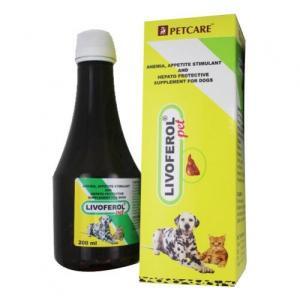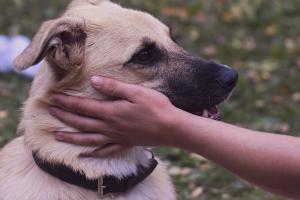Table of Contents
Pets may need liver supplements to support and maintain optimal liver function. The liver plays a crucial role in detoxifying the body, processing nutrients, and regulating metabolism. Over time, factors like age, poor nutrition, medications, and certain medical conditions can strain the liver. Liver supplements can help improve liver health, stimulate appetite, and aid digestion. They are particularly beneficial for pets with liver issues, recovering from illnesses, or experiencing reduced appetite and energy levels. Consulting with a veterinarian can help determine if a liver supplement is appropriate for your pet’s needs.

What Is Livoferol Supplement?
The Pet Care Livoferol Supplement enhances liver function by regulating hepatic microsomal enzymes. This supplement promotes optimal liver health in your pet, improving appetite, digestion, and sleep quality. Additionally, Livoferol contains Vitamin B, which supports enhanced metabolism in your furry companion.
Ingredients
Each 30ml of this supplement contains:
- Ferrous Gluconate: 200mg;
- Ferrous Chloride: 80mg;
- Thiamine Hydrochloride: 5mg;
- Riboflavin: 3mg;
- Nicotinic Acid: 20mg;
- Nicotinamide: 45mg;
- Calcium Lactate: 300mg;
- Liver Fraction 2: 150mg (derived from 3.75g of fresh liver).
All these components are blended in a delicious flavored syrup base.
Indications
- To enhance appetite;
- for the management of hepatitis (both bacterial and viral);
- to address multiple deficiency anemia;
- particularly beneficial during periods of debility or convalescence.
Dosage Sizes
|
Pet Type |
Dosage |
Frequency |
|
Puppies |
5ml |
twice a day |
|
Dogs |
10ml |
twice a day |
|
Cats |
2.5ml |
twice a day |
|
Pet Birds |
10-15ml |
per 100 birds |
Important Safety Information for Pet Owners
Always consult your veterinarian before starting any new supplement regimen for your pet. They can guide whether Livoferol suits your pet’s specific health needs.
Ensure accurate dosing by using the appropriate measuring tools provided with the product. Follow the recommended dosages for your pet’s type and weight as provided by your veterinarian or the product label.
After starting the supplement, pay close attention to your pet’s health and behavior. If you notice any unusual symptoms, reactions, or discomfort, discontinue use immediately and consult your veterinarian.
Pets should not have access to the supplement bottle. Ingesting too much at once can be harmful.
Inform your veterinarian about any other medications or supplements your pet takes to avoid potential interactions.
Be aware of any potential allergies your pet may have to the ingredients in the supplement. If your pet has a known allergy, consult your veterinarian before use.
Veterinary Prescription
Pet Care Livoferol Supplement does not require a veterinary prescription for purchase in most cases. However, regulations regarding the sale of pet supplements can vary by location.
Contact the retailer or store where you plan to purchase the supplement. They can provide information about their specific requirements for selling pet supplements.
It’s always a good idea to consult your veterinarian before starting any new supplement for your pet. They can recommend the most appropriate supplements based on your pet’s health needs.
If you plan to purchase the supplement online, review the website’s policies regarding prescription requirements, if any.
Remember that even if a prescription is not required, consulting your veterinarian is advisable to ensure that the supplement is appropriate for your pet’s health and specific needs.
Interactions
Interactions with supplements and medications can sometimes occur, so you must be aware of potential interactions when giving your pet Pet Care Livoferol Supplement. Here are some potential interactions to consider:
- Other Medications: If your pet takes other medications, there may be interactions with Pet Care Livoferol Supplement. Consult your veterinarian to ensure there are no adverse effects or reduced efficacy of other medications when combined with this supplement.
- Iron Supplements: Pet Care Livoferol Supplement contains iron (Ferrous Gluconate and Ferrous Chloride). If your pet is already receiving iron supplements or is on iron medication, there could be an increased risk of iron overdose. Discuss this with your veterinarian.
- Vitamins and Minerals: Livoferol also contains vitamins and minerals, including Thiamine, Riboflavin, Nicotinic Acid, Nicotinamide, and Calcium Lactate. If your pet is already receiving vitamin or mineral supplements, there may be potential interactions or an increased risk of overdose. Again, consult your veterinarian to ensure safe supplementation.
- Underlying Health Conditions: Pets with underlying health conditions, such as liver disease, may require specific care and monitoring. Before giving any supplement, especially one that affects the liver, please consult your veterinarian to ensure it is safe and appropriate for your pet’s condition.
- Allergies: Be aware of any potential allergies your pet may have to the ingredients in the supplement. Avoid using the supplement if your pet has a known allergy to any of the components.
- Food Interactions: Some supplements are best administered with or without food to maximize absorption and minimize potential gastrointestinal upset. Follow the recommended administration instructions for the supplement.
- Monitoring: Regardless of potential interactions, monitoring your pet’s health and behavior is essential after starting any new supplement. If you notice any adverse effects or changes in your pet’s condition, contact your veterinarian promptly.
Remember that your veterinarian is the best resource for understanding potential interactions and ensuring your pet’s safe and appropriate use of Pet Care Livoferol Supplement.

Side Effects
While Pet Care Livoferol Supplement is generally considered safe when used as directed, some pets may experience side effects. It’s essential to be aware of these potential side effects and to monitor your pet closely when introducing any new supplement. If you notice any concerning symptoms, contact your veterinarian. Common side effects of Livoferol Supplement may include:
- Gastrointestinal Upset: Some pets may experience mild gastrointestinal upset, including nausea, vomiting, diarrhea, or changes in appetite. If these symptoms persist or worsen, discontinue the supplement and consult your veterinarian.
- Allergic Reactions: In rare cases, pets may exhibit signs of an allergic reaction, such as itching, swelling, hives, or difficulty breathing. If you suspect an allergic reaction, discontinue use immediately and seek immediate veterinary care.
- Iron Overload: Livoferol contains iron, and excessive iron intake can lead to iron overload or toxicity. Symptoms of iron toxicity may include vomiting, diarrhea, lethargy, and, in severe cases, organ damage. Ensure the supplement is used according to the recommended dosage and monitor for signs of iron overdose.
- Interactions: Depending on your pet’s current medications and health conditions, interactions or adverse effects may occur. Always consult your veterinarian before introducing a new supplement to your pet’s regimen, especially if they are already on other medications.
- Other Side Effects: While less common, some pets may react differently to supplements. Watch for unusual or unexpected changes in your pet’s behavior, energy levels, or overall well-being.
Not all pets will experience side effects, and many will benefit from the supplement’s intended effects. However, close monitoring and communication with your veterinarian are key to ensuring the well-being of your furry companion when using any dietary supplement.
Overdose
An overdose of Pet Care Livoferol Supplement can harm your pet, mainly due to its iron content and other active ingredients. If you suspect that your pet has ingested an excessive amount of the supplement, you should take immediate action:
- Contact Your Veterinarian: Call your veterinarian or an emergency veterinary clinic when you suspect an overdose. They can provide guidance based on your pet’s specific situation.
- Provide Information: Be ready to provide information about your pet’s age, weight, the amount and type of supplement ingested, and any symptoms your pet may be experiencing.
- Monitor Your Pet: While waiting for professional advice, keep a close eye on your pet’s condition. Look for symptoms of overdose, which may include vomiting, diarrhea, lethargy, weakness, abdominal pain, or any unusual behavior.
- Do Not Induce Vomiting: Do not attempt to induce vomiting in your pet unless specifically instructed by a veterinarian. Inducing vomiting can be dangerous in certain situations and should only be done under professional guidance.
- Follow Veterinary Advice: Follow their instructions carefully once you contact your veterinarian. They may recommend treatment options such as activated charcoal administration or intravenous (IV) fluids to mitigate the effects of the overdose.
- Prevent Future Overdoses: Take precautions to prevent future overdoses by securely storing the supplement out of your pet’s reach and using it strictly according to the recommended dosage guidelines.
An overdose of iron-containing supplements like Livoferol can lead to iron toxicity, which can be serious and potentially life-threatening. Prompt veterinary intervention is crucial to assess the severity of the overdose and provide appropriate treatment.
Storage
Store the supplement in a cool, dry place away from direct sunlight, moisture, and extreme temperatures. A room temperature of 59-77°F (15-25°C) is generally suitable.
Ensure the container or bottle is tightly sealed to prevent moisture and air from getting inside after each use. This helps maintain the quality of the product.
Store the supplement in a location that is inaccessible to pets and children. Pets should not have access to the bottle or container to prevent accidental ingestion. Store the supplement away from human food and medications to prevent any mix-up or contamination.
Always check the expiration date on the product packaging. Do not use the supplement if expired, as its effectiveness may be compromised.
Do not store the supplement in areas prone to high humidity, such as bathrooms or kitchens, as moisture can degrade the product.
Keeping the supplement in its original packaging is good practice, which typically protects against light and moisture.
FAQ
What are the main benefits of using Livoferol Supplement for my pet?
Livoferol Supplement enhances liver function, stimulates appetite, manages hepatitis (bacterial/viral), and corrects multiple deficiency anemia. It may also aid in recovery during periods of debility or convalescence.
How do I administer Livoferol Supplement to my pet?
The recommended dosage varies based on your pet’s type and weight. Typically, it’s administered orally, but always follow the specific dosing instructions provided on the product label or by your veterinarian.
Can Livoferol Supplement interact with other medications my pet is taking?
Yes, Livoferol Supplement may interact with other medications. Consult your veterinarian to ensure there are no adverse interactions with your pet’s current medications.
Is there a risk of overdose with Livoferol Supplement?
Yes, there is a risk of overdose, especially due to its iron content. Keep the supplement out of reach of pets and follow the recommended dosage instructions carefully.
Can I use Livoferol Supplement for puppies and kittens?
Yes, Livoferol Supplement can be used for puppies and kittens, but following the appropriate dosage guidelines for their age and weight is essential.
When should I consult my veterinarian regarding Livoferol Supplement use?
You should consult your veterinarian before starting Livoferol Supplement if your pet has underlying health conditions, is taking other medications, or if you have any concerns about its suitability for your pet’s specific needs. Additionally, seek veterinary advice if you notice any unusual symptoms or reactions in your pet after starting the supplement.
Olivia Bennet is a veterinarian who has worked in a veterinary clinic for many years. She specializes in the diagnosis, disease prevention, and treatment of not only cute kittens and puppies but also large farm animals. Olivia loves animals, cares about them, and wants to help you know more about your pets.

































